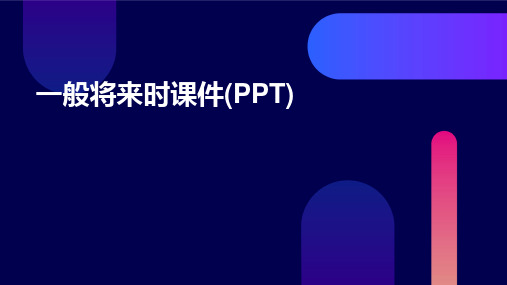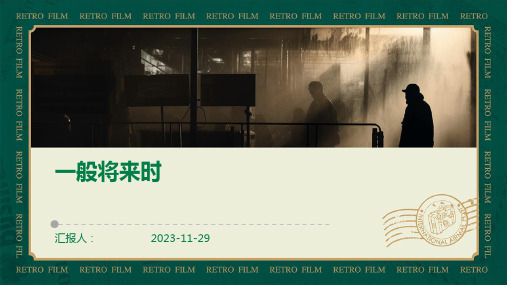小学英语一般将来时课件演示
(完整版)一般将来时课件(PPT)

①
②
③
① Who will have an English party next week ?
② What will they have next week ?
③ When will they have an English party?
2. be going to 表将来
will 和be going to 的区别
回答:(肯)Yes,主语+will. (否)No,主语+won’t.
Yes,they will./No,they won’t.
They won’t(will not) have an English party next week.
注意:won’t=will not
(3).变特殊疑问句
They will have an English party next week.
他现在在北京。 He __i_s_ in Beijing now.(be)
他昨天在上海。
He w__a_s in Shanghai yesterday. (be) Hew_i_ll_be in Shanghai tomorrow. (be)
二、一般将来时的时间状语
1.与“tomorrow一家” 连用:
buy the oranges tomorrow?
2.Who _w_i_ll_i_n_ve_n_t (invent) a new
computer in 2050? 3.We _w_il_l _g_o (go) to the cinema next
Sunday. The film _w_il_l _b_e (be) very
6. He usually _g_e_t_s (get) up at 6 in the morning. Look! He i_s_g_e_t_t_in(gget) up now. But yesterday he _g_o_t_ (get) up very late, so he _w_e_n_t (go) to
(完整版)一般将来时课件(PPT)

2.与“next一家” 连用
next
time year week month term Monday at 7:00 next Sunday morning ……
2.He will find some meat in the fridge soon. (变一般疑问句) W __i_ll he _f_in_d _a_n_y_ meat in the fridge?
3.She will stay there in a week. (对划线部分提问) __H_o_w _s_o_on_ w_i_ll__ she _s_t_a_y_ there?
We will/shall go to Beingjing next week.
He will go to Beingjing next week
(2).变一般疑问句和否定句:
They will have an English party next week. Will they have an English party next week?
2. be going to+do可表示事先计划的意图,而 will 则表示说话人当时决定的意图;
We're going to drive you home after the meeting. Don't call a taxi. We'll drive you home.
I feel ill now, and I'll go to see the doctor. I'm going to see the doctor this evening.
一般将来时课件(PPT)

“be able to”表示将来有能力做某 事时,使用一般将来时形式,例如“I will be able to help you”。
情态动词如“can”、“may”、 “must”等,在一般将来时中通常直 接加动词原形,例如“I can swim”。
03
一般将来时在句子中的运用
陈述句中的使用
表示将要发生的动作或存在的状态
纠正方法
应使用正确的将来时形式,如 "He will go to the park tomorrow." 或 "He is going to the park tomorrow."
忽略动词变化规则
错误示例
They will play football in the future.(忽略了动词play在将来时中的变化)
纠正方法
在将来时中,应使用正确的助动词或情态动词形式,如 "I will be able to help you with your homework." 或 "I can help you with your homework."
错误示例
He will must finish his work before leaving.(错误地使 用了情态动词must)
作用
用于表示未来的计划、打算、预测、 假设等。
常见表达形式
will + 动词原形
表示将来的动作或状态,如“I will go to the park tomorrow.”(我明天将去公园。)
be going to + 动词原形
表示计划、打算或即将发生的动作,如“I am going to study hard this semester.”(我这 学期打算努力学习。)
一般将来时PPT课件

•一般将来时基本概念•一般将来时结构与用法•一般将来时时间状语及标志词•一般将来时与其他时态对比•一般将来时在各类从句中运用•一般将来时误区及注意事项•总结回顾与拓展延伸目录01一般将来时基本概念定义与特点定义特点表现形式will + 动词原形be going to + 动词原形现在进行时表示将来预测未来计划与安排条件与假设030201使用场景02一般将来时结构与用法主语+ be not going to + 动词原形+ 其他成分主语+ be to not (非标准用法,尽量避免使用) + 动词原形+ 其他成分主语+ will not (won't) + 动词原形+ 其他成分Will + 主语+ 动词原形+ 其他成分?Be + 主语+ going to + 动词原形+ 其他成分?Be + 主语+ to + 动词原形+其他成分?(较少使用,多用于书面语)特殊疑问词动词原形特殊疑问词going to +成分?特殊疑问词to +(较少使用,多用于书面语)注意:在一般将来时的使用中,要注意区分不同语境和表达方式的细微差别,选择合适的结构进行表达。
同时,也要注意与其他时态的区分和联系,避免混淆使用。
特殊疑问句结构03一般将来时时间状语及标志词常见时间状语表示将来的时间状语表示计划或安排的时间状语标志词识别与运用04一般将来时与其他时态对比与现在进行时对比时间指向不同01动词形式差异02使用情境不同03时间基准差异动词形式变化使用情境区别时间范围不同动词形式区别使用情境差异05一般将来时在各类从句中运用在宾语从句中运用01 02定语从句的时态取决于它所修饰的先行词,如果先行词是将来时态,定语从句也使用将来时态。
如果先行词是过去将来时,定语从句则使用过去将来时。
定语从句中表示将来的时间状语有:tomorrow, next year, in the future 等。
06一般将来时误区及注意事项误区二过度使用“will”和“going to”。
一般将来时课件ppt(共17张PPT)

Jim going to
afternoon?
in the playground tomorrow
4. .Jim is going to play football in the playground tomorrow afternoon.
Jim going to play football tomorrow afternoon?
2)在浊辅音和元音后读/d/.
一般过去时, 要用动词过去式. Jim is going to play football in the playground tomorrow afternoon.
Jim is going to play football in the playground tomorrow afternoon. ⑵are变为were。
there were many beautiful flowers there. 一般将来时表示将来某个时间要发生的动作或存在的状态常与表示将来的时间状语连用
⑴am ,is变为was。
So she They to read some books.
What did they do in the park? 1)在清辅音后读/t/ .
(3).动词过去式变化规则
a)一般情况下,直接加ed.如:wash--washed, look---looked; b)以不发音字母e结尾的,加d.如:like---
liked, dance---danced; c)以“辅音字母+y”结尾的,变y为i再加ed. 如:study---studied;
food and (play) lots of games. They
(come) home at 4:30.
一般将来时PPT课件

一、单项选择
(C) 1. There __________ a meeting tomorrow afternoon.
A. will be going to B. will going to be C. is going to
shall常用于第一人称. shall
否定式:shall not = shan’t
will常用于第二、三人称,但在 will 口语中各种人称都可以用will.
否定式:will not = won’t
四、现_在___进__行___时态 + 表示将来的时 间状语也可以表示将来。
五、There be 句型的一般将来时态 的结构:there +is_g_o_in_g_to_ + be + 名词或there + will+ be + 名词。
begoingto表示根据主观判断将来肯定发生的事情表示根据主观判断将来肯定发生的事情will表示客观上将来势必发生的事情
The Simple Future Tense
一、一般将来时表示将来某一 时刻的动作,状态以及打算。 该时态一般与表示将来意义 的时间状语连用。如:
tomorrow, this month, the day
next week.
A. will be; is
B. is; is C. will be; will be D.
is; will be
(D) 4. There ________ a dolphin show in the zoo
tomorrow evening.
A. was B. is going to have C. will have D. is going
一般将来时公开课PPT课件

.will
2
What is she going to do?
She’s going to shop/ go shopping.
will .
3
What are they going to do ?
They are going to dance.
will.
4
英汉互译。 1.我打算下个月将去长城玩参观。 I am going to visit the Great Wall next month.
❖ She is going to play basketball next Sunday.
❖ 否定句:在be 的后面加not即可。
❖ She is not going to play basketball next Sunday.
❖ 一般疑问句:把be提到句子主语之前,结尾变问号。
❖ Is she going to play basketball next Sunday?
will he(they/she) do?) next month, tomorrow , next week , in three
days (三天后),
.
12
.
13
“There be”句型的一般将来时:表示将来某地会有某人 或某物
肯定句: There will be +名词+其他成份
There is/are going to be +名词+其他成份
What will they do this evening?
They will watch TV.
.
9
are going to
造句:(任何主语都用will+动词原形)
一般将来时ppt课件

02 一般将来时的基本用法
表示将来要发生的行为
要点一
常见的助动词“will”和 “shall”可以用于表示将…
“I will go to the store tomorrow.”(我明天要去商店。 )
要点二
“be going to”也可以用于表达 将来要发生的行…
“It is going to rain later.”(待会儿要下雨了。)
肯定句
I am going to swim in the afternoon.
否定句
They are not going to watch the movie.
疑问句
Are you going to meet your friend tomorrow?
主语+be to+动词原形
肯定句
You are to hand in your homework tomorrow.
表示邀请或建议
总结词
表示邀请或建议某人做某事,通常用于 口语交流中。
VS
详细描述
在口语交流中,我们经常使用一般将来时 态来表示邀请或建议,例如:“Would you like to come to my house for dinner tomorrow?”(明天你想来我家 吃晚饭吗?)或者“Let's go for a walk after dinner.”(晚饭后我们去散步吧。 )
02
在一些情况下,我们也可以使用“be going to”来表达将来时
。例如
It is going to rain.(将要下雨了。)
03
构成
They are going to graduate next year.(他们将于明年毕业。)
- 1、下载文档前请自行甄别文档内容的完整性,平台不提供额外的编辑、内容补充、找答案等附加服务。
- 2、"仅部分预览"的文档,不可在线预览部分如存在完整性等问题,可反馈申请退款(可完整预览的文档不适用该条件!)。
- 3、如文档侵犯您的权益,请联系客服反馈,我们会尽快为您处理(人工客服工作时间:9:00-18:30)。
•I’ m going to buy a book. •I’ m going to take a look. •I’ m going to bake a cake. •I’ m going to walk near a lake. •We’ re going to take a trip. •We’ re going to take a sip. •I’ m going outside to play. •I’ m going to have a good day.
在什么时候 (提问时间) 选择哪一个(提问人或物) 谁 (提问人) 怎么样 (提问方式)
疑问词在句首,系动词be跟着走, 主语、going紧相随,其它成分不要丢。
顺口溜小记:
不久将要发生事,记住要用将来时。 be后紧跟going to,to后跟着动原形。 be有形式多变化,记得随着主语及时变。
I+am He/She+is You/We/They+are 某个人名+is如:Mike is
主语+be going to +动词原形+时间副词。
主语+will +动词原形+时间副词。
人称主语: 单数 第一人称: I 第二人称: you 第三人称: he\ she\
it\ (人名)
复数 we
you they
be 动词: am (与第一人称搭配) are (与第二人称或所有复数主语) is (与第三人称或者所有单数主语)
What is Xi Yangyang going to do?
He is going to wash the clothes.
What is Lan Yangyang going to do?
He is going to swim.
What is Fei Yangyang going to do?
火眼金星。看看下面的句子病在哪里呢?
1. We are going tovigsritandparents tomorro 2. She isgoing to go soon. 3. He is going toreabdooks this evening. 4. My parents is going to Beijing next we
They are going to ride a bike. They will ride a bike.
What is Hui Tailang going to do?
He is going to ski.
What is Lan Yangyang going to do?
He is going to sweep the floor.
/ year, this afternoon/ evening….等。
结构:主语+be动词+going to +动词原形+时间副词
主语+ will+ 动词原形+时间副词
例如:Jim is going to play football. Jim will play football.
否定形式:把be动词或will后面加not 例如:Jim is not going to play football.
He is going to catch butterflies.
Be going to 句型
be going to +动词原形:用来表示近期将要发生的动作, 或打算要做的事。
Will 译成 将要
经常跟一些表示将来时间的时间状语如:tomorrow、 this weekend、next week等连用,用来表示一般将 来时态。
Be going to句型的特殊疑问句形式。
疑问词 + Be动词 +主语 + going (to) +(动作)+(时间副词)?
W常he用re的疑are问词有y:ou going to play
tonight ?
what where when which who how
什么(提问事情) 在哪里 (提问地点)
我打算明天写作业。 他将要下周上学。 他们打算今晚看电视。
一般将来时(the future tense)
一般将来时表示将要发生的事或打算、计划
决定要做的事情。常与表示将来的时间状语连用。
标志性词:tomorrow, next, soon, tonight, next week/ weekend/ month
一般将来时:
构成:be going to + 动词原形
I am going to listen to music.
一般将来时:
构成:will + 动词原形
I will listen to music.
一般将来时的标志:
this evening, next week等。
构成:
be going to /will+ 动词原形+将来的时间 I will play football this afternoon. I am going to wash clothes next week.
Jim will not play football. 一般疑问句:把be动词或will调到句首, 例如:Is Jim going to play football?
Will Jim play football?
小练笔:
并变否定句、一般疑问句
1、我打算明天去打扫我的房间。
I'm going to clean my room tomorrow.
将来的时间:
this afternoon
this evening tonight
tomorrow
next week
next weekend next hol等
next year
What are they going to do? What will they do?
2、他这个周末准备去拜访他的祖父母。 He is going to visit his grandparents this weekend.
3、他们下周去旅行。
They are going to take a trip next week.
一般将来时的构成:
主语 + be going to + 地方 / 动词原形+(将来时间)…..
